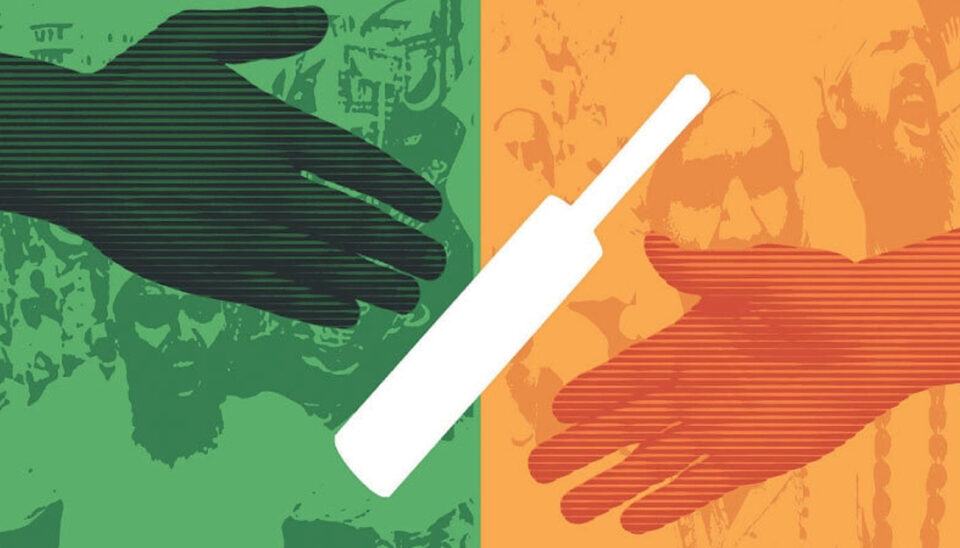At the end of the first Pakistan-India game in this year’s Asia Cup, the Indian team refused to shake the hands of their Pakistani counterparts. The move was broadly criticised within Pakistan and by some former cricket greats in other cricket-playing countries as well.
Most Indians have been going through an existential crisis of sorts after losing a short war against Pakistan in May this year. Not shaking hands with Pakistani players can, therefore, also be understood as an act of sulking brought on by the shock of losing a war to a much smaller neighbour.
One of the most common reactions to the sulky behaviour of the Indian players was that “politics should not be mixed with sport.” Nothing new in this, really. For decades, one has heard this over and over again. Indeed, one can’t help but agree with this sentiment, but when it comes to cricketing relations between India and Pakistan, politics is historically and inherently entrenched in these relations.
After the 1965 war between the two countries, both the countries snapped their cricketing ties. Things got even worse after the 1971 war between the two countries. Pakistan had accused India of aiding militant Bengali separatists in the erstwhile East Pakistan during a civil war there. In December 1971, East Pakistan broke away to become Bangladesh when India entered the war on the side of the separatists.
Cricket, whether one likes it or not, is inescapably linked to the turbulent waters that Pak-India relations tread and to suggest ‘keeping politics out of sport’ is to ignore this reality
Interestingly, though, both countries continued to compete regularly in international hockey events. But the hockey matches were often politically charged. For example, just a day before their match against India at the 1974 Asian Games, the Pakistan team played loud patriotic songs to irritate their Indian opponents lodged nearby.
In 1976, the government of Z.A. Bhutto in Pakistan gave the green light to the country’s cricket board to start talks with the Indian cricket board. The response of the Indian prime minister Indira Gandhi was positive. The two cricket boards met and decided to resume cricket ties by 1978. The ties were revived when India toured Pakistan in late 1978 (after 17 years) — even though, by then, Indira had lost power after the 1977 Indian elections, and the Bhutto regime had been overthrown in a military coup by Gen Ziaul Haq.
India-Pakistan relations remained somewhat stable until 1982, when the Indian government — once again headed by Indira — accused Pakistan’s military regime of providing support to Sikh separatists. This did not impact the cricketing ties between the two countries, though. However, in 1984, the Indian team cut short its tour of Pakistan when Indira was assassinated by her Sikh bodyguards. By 1986, tensions between the two countries started to mount once again. Both the countries were set to jointly host the 1987 Cricket World Cup.
In February 1987, as India began amassing its troops along the Pakistani border, Gen Zia paid an unscheduled visit to New Delhi. Pakistan was still deeply involved in the anti-Soviet insurgency in Afghanistan. The Pakistan cricket team was touring India at the time. Zia’s visit came as a surprise to the Indian PM Rajiv Gandhi.
Zia announced he had come to watch a Pakistan-India Test match with the Indian PM. Rajiv, though hesitant at first, obliged. The two did visit the stadium to watch some cricket. But they mostly talked politics. Zia dubbed his trip as a “Cricket for Peace Tour” and managed to defuse tensions between the two countries. Political commentators dubbed this as “cricket diplomacy.”
But relations between the two countries began to deteriorate once again in the 1990s. The escalation of militancy in Kashmir led to a sentiment (in India) that bilateral cricketing ties should be avoided. The electoral appeal of Hindu nationalists in India had begun to expand as well. Hindu nationalism is radically anti-Muslim/anti-Pakistan. Even though the two countries played against each other in one day international (ODI) tournaments — including jointly hosting the 1996 World Cup — Test matches between the two came to a standstill.
It was only in 1999 — a decade after the 1989-90 Test series — that the two countries once again fully restored cricket ties. In 1999, a Hindu nationalist government was in power but it had decided to stabilise relations with Pakistan — especially at the behest of Pakistani PM Nawaz Sharif.
It was a tense series. Radical Hindu nationalist organisations were constantly threatening the Pakistani players and, in one case, destroyed the pitch in Delhi on which a Test had to be played. Just months later, war between the two countries erupted in Kargil and Sharif was toppled in a military coup by Gen Pervez Musharraf. Cricket ties between the two countries snapped again.
Three years later, relations between India and Pakistan began to stabilise and, once again renewal of cricket ties was used to signal this. In 2003, India toured Pakistan after 15 years. Pakistan toured India in 2005, India returned in 2006, and Pakistan toured India again in 2007. Former Pakistan cricket board chairman and diplomat, the late Shahryar Khan, described this period as one of the most robust years of cricket diplomacy between the two countries.
But cricket ties snapped once again after a terrorist attack in Mumbai in 2011. Things got even worse after a more radical Hindu nationalist government came to power in India in 2014 and Pakistan was facing terror attacks from militant Islamists and Baloch separatists.
Both countries accused each other of aiding terrorism in their countries. They continued to play against each other in ODI and T20 events on neutral venues, even though Pakistan travelled to India to play the 2023 World Cup. There have been no bilateral Test, ODI and T20 series between the two countries since 2007, except one in 2012 when Pakistan toured India for a short ODI/T20 series.
One can also posit that hockey, once a popular sport in both the countries, suffered due to the constant usage of cricket as a tool for political diplomacy. Nevertheless, the possibility of cricket diplomacy has continued to shrink. Politics is inherently mixed with cricket when it comes to Pakistan-India cricket ties. Saying that it shouldn’t is not a practical sentiment.
The fact is, one can’t help but mix the two. Therefore, I think the more appropriate thing to suggest would be to mix it in a way that is not detrimental to the game. But, unfortunately, it has become detrimental — not only for cricket in both the countries, but for the larger cricketing world as well. And India can now be pointed out as a leading culprit in this regard.

